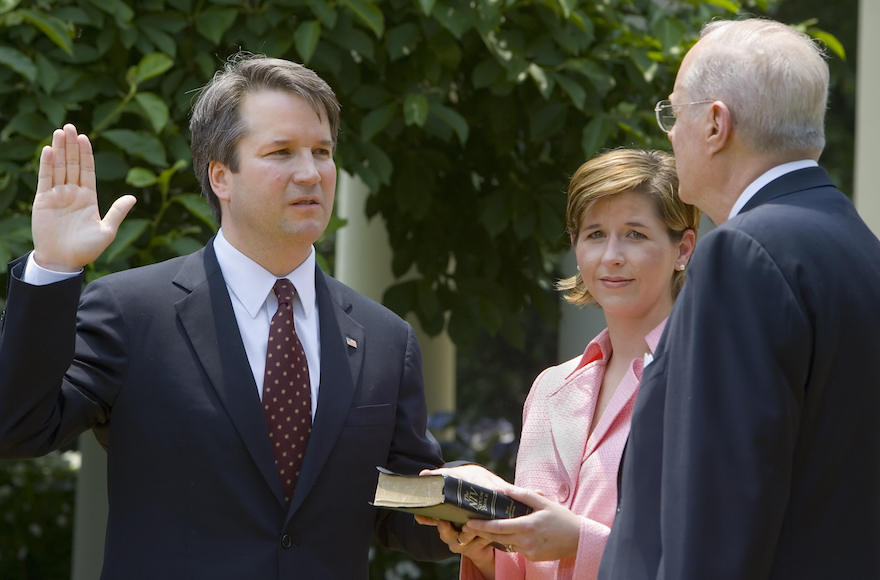Trump nominates Brett Kavanaugh to serve on Supreme Court
Published July 9, 2018

Brett Kavanaugh and his wife Ashley shown in the Rose Garden of the White House in June 2006 as he was sworn in as a federal appeals judge. (Paul J. Richards/AFP/Getty Images)
(JTA) — President Donald Trump nominated Brett Kavanaugh to replace Supreme Court Justice Anthony Kennedy upon his retirement at the end of July.
A federal appeals court judge in Washington, Kavanaugh, 53, is well respected by the Republican establishment, although some on the right have said he is not conservative enough. Trump reportedly was wary of Kavanaugh’s close ties to George W. Bush, who nominated him to his current position in 2003.
“A judge must interpret the law, and not make the law,” Kavanaugh said in remarks from the East Room of the White House Monday night. “A judge must interpret statues as written, and a judge must interpret the Constitution as written, informed by history and tradition and precedent.”
He also thanked Associate Justice Elena Kagan, who hired him to teach a course on the Supreme Court when she was dean of Harvard Law School.
Kavanaugh is a graduate of Yale Law School, and he clerked for Kennedy on the Supreme Court. He helped draft the Starr Report, which called for President Bill Clinton to be impeached because he lied about having had a sexual relationship with Monica Lewinsky, a White House intern.
He fought on the legal team urging Florida not to have a recount in the 2000 presidential election between Bush and Al Gore, Clinton’s vice president. The Supreme Court decision not to do so led to Bush becoming the president. Kavanaugh served in the Bush administration, including as the president’s staff secretary. His wife, Ashley Estes, served as personal secretary to George W. Bush.
In 2015, Kavanaugh, a Roman Catholic, filed a dissent in a case involving religious employers and reproductive rights. The case said that religious employers did not have to provide contraceptives but had to file a form telling the government they were not doing so, but Kavanaugh argued that the requirement violated religious freedom. Kavanaugh has stated that he considers Roe v. Wade binding and would seek to uphold it, though he has ruled in some cases to place restrictions on abortion.
Liberal Jewish groups, such as the National Council of Jewish Women, expressed their dismay when Kennedy announced his retirement last month.
“Justice Kennedy’s retirement could drastically shift the balance of the Supreme Court, and threaten the very rights and liberties we’ve fought so hard to protect,” NCJW tweeted last Wednesday. “We need a justice who will stand up for all of our rights – not just the wealthy and powerful.”
Like NCJW, the Jewish establishment tends to take progressive stances on domestic issues such as reproductive rights, LGBTQ rights, gun control and separation of church and state. Though Kennedy was seen as a conservative justice, he was a swing vote on some issues and authored opinions legalizing same-sex marriage and keeping Roe v. Wade intact.
Orthodox groups are likely to welcome a court that protects public religious expression over strict separation, as it did in a recent ruling confirming a baker’s right to refuse to bake a cake for a same-sex wedding.
Trump’s pick will need to be confirmed by the Senate and can expect opposition from Democratic lawmakers.















